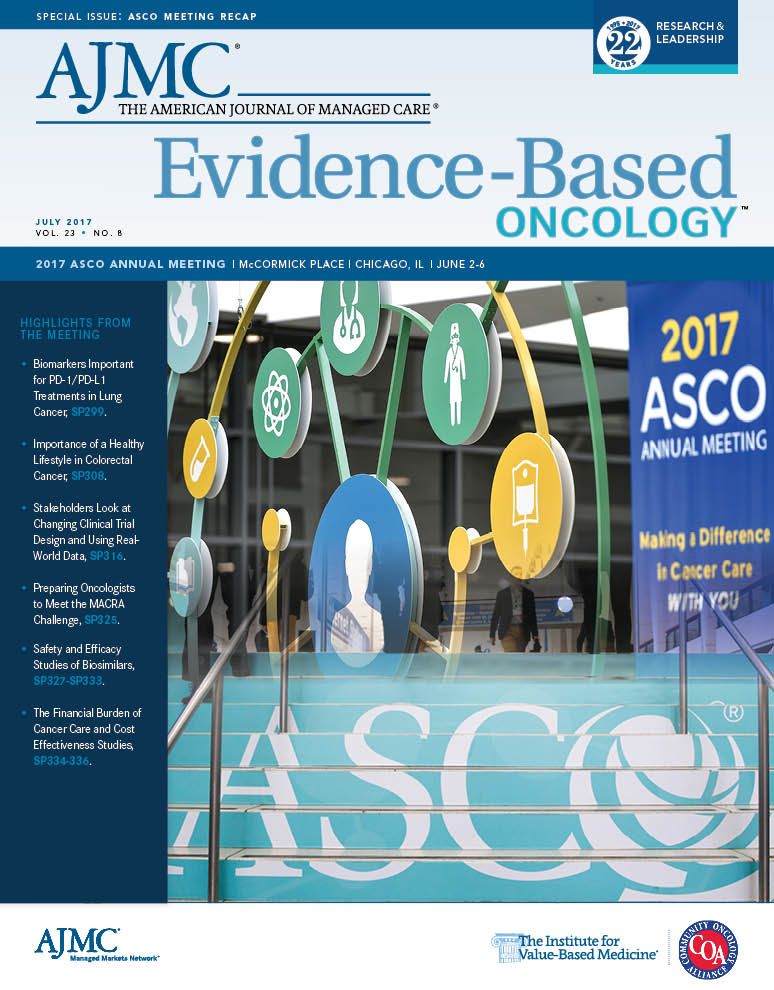- Center on Health Equity & Access
- Clinical
- Health Care Cost
- Health Care Delivery
- Insurance
- Policy
- Technology
- Value-Based Care
Fas Biomarker Can Predict Response to Second-Line Therapy for Advanced Soft Tissue Sarcoma
In a study performed by the Grupo Español de Investigación en Sarcomas, Fas biomarker detection showed value in predicting progression-free and overall survival after trabectedin administration to patients with advanced soft tissue sarcoma.
FAS BIOMARKER DETECTION HAS
shown value in predicting progression-free and overall survival (PFS and OS) after trabectedin administration to patients with advanced soft tissue sarcoma. This outcome of a study performed by the Grupo Español de Investigación en Sarcomas (GEIS) was reported in a poster session at the 2017 American Society of Clinical Oncology Annual Meeting.1
Several second-line options are available for advanced soft tissue sarcoma as gemcitabine combinations or trabectedin, pazopanib, eribulin, or olaratumab plus doxorubicin in cases where anthracycline administration is still possible. The lack of predictive biomarkers, however, hinders rational selection of the best sequence of second-line therapies. GEIS demonstrated the prognostic value of Fas detection in first-line treatment of advanced soft tissue sarcoma in 2016.2
The 2016 randomized, open-label phase 2 trial compared trabectedin plus doxorubicin versus doxorubicin alone as first-line treatment of advanced soft tissue sarcomas. The trial was stopped early because risk reduction for the main endpoint was <9.64% in the experimental arm.2
Trabectedin (Yondelis) is a multimodal, synthetically produced antitumor agent, originally derived from the sea squirt, Ecteinascidia turbinata. The drug exerts its activity by targeting the transcriptional machinery and impairing DNA repair. It is approved in close to 80 countries in North America, Europe, South America, and Asia for advanced soft tissue sarcomas as a single-agent and for relapsed ovarian cancer in combination with doxorubicin HCl liposome injection in the European Union.3
Translational research, however, was performed to correlate expression of apoptotic and DNA repair genes with clinical outcome. Fas and p53 were shown to be prognostic factors for progression-free survival (7.0 months in cases of Fas positivity and p53 negativity; 3.4 months in cases of Fas positivity and p53 positivity or Fas negativity and p53 negativity; and 0.7 months in cases of Fas and p53 positivity; P <.001). Fas and p53 were also shown to be prognostic factors for OS.2
The present study analyzed the predictive role of Fas detection in various second-line therapies. Major relevant selection criteria were having received trabectedin second-line or beyond for advanced soft tissue sarcoma or progressive disease after at least 1 previous line of therapy for advanced soft tissue sarcoma.
A tissue microarray was set up for Fas staining and 2 expert, blinded pathologists reviewed and classified cases as negative, weak, or strong. Kaplan-Meier estimations were used for time-to-event variables and the log-rank test was used to compare groups.
A series of 198 patients met selection criteria. Metastases at diagnosis occurred in 46 (24%) patients, and median time to metastases was 18.8 months (range, 16.3-21.3). The line previous to trabectedin consisted of gemcitabine combination in 83 patients (42%), doxorubicin-based therapy in 65 (33%), and others in 50 (25%). Median PFS for previous and trabectedin lines were 3.5 (range, 2.8-4.2) and 3.4 (range, 2.8-4) months, respectively.
Fas positivity was associated with significantly longer PFS for the previous trabectedin line: 4.1 (range, 1.5-6.7) versus 3.0 (range, 2.5-3.5) months, P = .01. Fas positivity was associated with shorter PFS for the trabectedin line (2.5 [range, 2.2-2.8] vs 3.7 [range, 2.7-4.8] months, P = .028).
These results were more notable in cases of liposarcomas: 7.0 (3.6-10.5) versus 4.3 (1.9-6.6) months, P = .017, in the previous line and 2.4 (range, 2.2 -2.6) versus 6.5 (range, 3.8-9.3) months, P <.001 in the trabectedin line.
From the time of trabectedin administration, Fas positivity was associated with significantly shorter OS, especially in liposarcomas: 11.9 (range, 5.2-18.7) months versus 21.7 (range, 12.7-30.8) months, P = .002. The researchers concluded that Fas is a valuable biomarker in predicting PFS and OS after trabectedin administration in patients with advanced soft tissue sarcoma. The various prognostic roles of Fas detection across distinct lines and its relevance in liposarcomas deserve further attention.
GEIS is a scientific society founded in 1994 to meet a need for cooperation in the medical treatment of soft tissue sarcoma. The group is composed of professionals from more than 60 medical centers across Spain, including oncologists, surgeons, pediatricians, oncologic radiation therapy specialists, pathologists, and molecular researchers.4REFERENCES
1. Broto JM, Marcilla D, Ramos R, et al. Predictive role of FAS for trabectedin in second lines of advanced soft tissue sarcoma (ASTS): A Spanish group for research on sarcoma (GEIS) study. J Clin Oncol. 2017;35(suppl; abst 11071).
2. Martin-Broto J, Pousa AL, de Las Peñas R, et al. Randomized phase II study of trabectedin and doxorubicin compared with doxorubicin alone as first-line treatment in patients with advanced soft tissue sarcomas: a Spanish Group for Research on Sarcoma study. J Clin Oncol. 2016;34(19):2294-2302. doi: 10.1200/JCO.2015.65.3329.
3. PharmaMar announces encouraging results in clinical trials of lurbinectedin in endometrial and breast cancers [press release]. Madrid, Spain: PharmaMar; June 13, 2017. pharmamar.com/wp-content/uploads/2017/06/PR-PharmaMar_ Post-ASCO.pdf. Accessed June 30, 2017.
4. GEIS. grupogeis.org. Accessed June 30, 2017.

Telehealth Intervention by Pharmacists Collaboratively Enhances Hypertension Management and Outcomes
January 7th 2026Patient interaction and enhanced support with clinical pharmacists significantly improved pass rates for a measure of controlling blood pressure compared with usual care.
Read More
Exploring Racial, Ethnic Disparities in Cancer Care Prior Authorization Decisions
October 24th 2024On this episode of Managed Care Cast, we're talking with the author of a study published in the October 2024 issue of The American Journal of Managed Care® that explored prior authorization decisions in cancer care by race and ethnicity for commercially insured patients.
Listen

